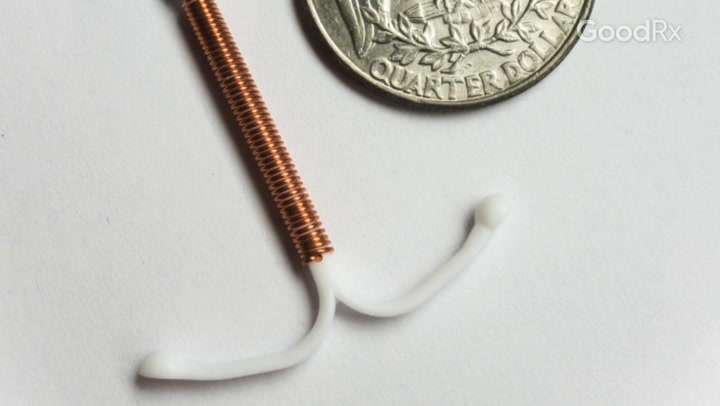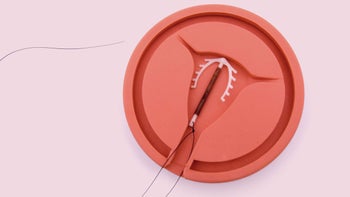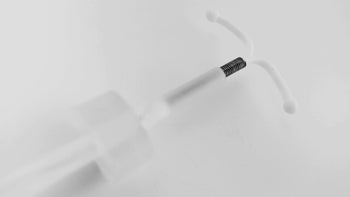
What Are the Side Effects of Liletta?
Key takeaways:
Liletta (levonorgestrel) is a very effective form of long-term birth control. It’s an intrauterine device (IUD) that can prevent pregnancy for up to 6 years at a time.
A change to your menstrual periods is the most common side effect after Liletta is placed. Vaginal infections and acne are also common.
Serious Liletta IUD side effects are rare, but include device movement, pelvic infection, and ectopic pregnancy. If you have symptoms of these side effects, contact your healthcare provider immediately.
Table of contents

Many long-acting birth control options are available. The Liletta intrauterine device (IUD) is one option that you may be considering. Liletta is a very effective contraceptive that works for years after it’s placed. But it does have some side effects to consider.
In this article, we’ll discuss some of the Liletta IUD’s side effects, and what to do if they happen to you.
What is Liletta?
Liletta is a type of birth control known as an IUD. It’s a device that’s inserted into the uterus by a healthcare provider. An IUD can be placed during an appointment at your provider’s office. Liletta offers an alternative to birth control pills.
Liletta can effectively prevent pregnancy for up to 6 years. In fact, it’s over 99% effective. Liletta is similar to other hormone-containing IUDs, such as Mirena (levonorgestrel) and Kyleena (levonorgestrel).
How does Liletta work for birth control?
Liletta contains the hormone levonorgestrel. Levonorgestrel is a progestin (a lab-made version of the sex hormone progesterone).
Liletta prevents pregnancy by:
Thickening mucus made by the cervix. This can prevent sperm from reaching an egg.
Slowing down sperm movement. This also helps stop sperm from reaching an egg.
Lowering sperm survival in the uterus. This means fewer sperm are available to cause pregnancy.
Thinning the lining of the uterus. This can make it more difficult for a fertilized egg to implant in the uterus and start a pregnancy.
Once Liletta is placed in the uterus, it releases levonorgestrel slowly for up to 6 years.
10 Liletta IUD side effects you should know about
There are both common and rare Liletta IUD side effects to know about. Here, we’ll start discussing some common side effects that can happen when Liletta is placed or removed. Then, we’ll move onto some of the more serious side effects to be aware of.
These aren’t the only side effects that can happen with Liletta. These are just some notable ones.
1. Side effects during Liletta placement
Having an IUD placed can cause pain for some people. But it’s usually mild and the worst of it typically only lasts for a few minutes after Liletta is placed.
You may also have bleeding after Liletta is placed. It’s normal for spotting to continue for a few weeks after having Liletta inserted.
Sometimes your healthcare provider will recommend taking ibuprofen (Advil, Motrin) before your appointment to help make Liletta placement more comfortable.
2. Side effects during IUD removal
When an IUD is removed, you may experience spotting or cramping. This improves quickly for most people. If you experience fever, severe pain, or unusual vaginal discharge after having Liletta removed, contact your healthcare provider.
If you’re not having another IUD placed or switching to another form of birth control, your periods will likely return to the way they were before Liletta was placed. It's important to remember that you could get pregnant right away after having Liletta removed.
3. Period changes
Liletta may cause breakthrough bleeding. This side effect is more common during the first 3 to 6 months of starting it. But over time, many people experience lighter periods. As many as 40% of Liletta users end up not having periods at all by the end of 6 years. But it’s also possible to have heavier periods.
4. Vaginal Infections
Both bacterial and fungal (“yeast”) vaginal infections are common after having Liletta placed. About 19% of Liletta users reported one of these infections during clinical studies. If you have vaginal irritation or a change in vaginal discharge while using Liletta, contact your healthcare provider. These could be signs of an infection.
5. Acne
Acne is another common side effect of Liletta. In clinical studies, about 15% of women using Liletta developed acne. Worsening acne is common with birth control that only contains a progestin.
6. Ovarian cysts
Slightly less than 5% of people who used Liletta in studies developed cysts on their ovaries that caused symptoms, such as abdominal pain. Most people with ovarian cysts from Liletta had no symptoms at all. These cysts usually resolve on their own within 2 to 3 months.
7. IUD expulsion or movement
These are more serious Liletta IUD side effects. While you have an IUD, there’s a risk that it can move out of place. If this happens, your risk of getting pregnant goes up.
Liletta could be pushed out of the uterus. This is called expulsion, and it’s fairly uncommon. In clinical trials, expulsion happened to about 4% of women.
Liletta also has a small risk of becoming stuck in the wall of the uterus. Very rarely, it can move through the wall of the uterus. If your Liletta IUD becomes stuck in or goes through your uterus, you may need surgery to have it removed.
After having Liletta placed, two threads will hang out of your cervix. It’s a good habit to check for these threads once a month. Contact your healthcare provider if you notice the length of these threads change, or if you can’t feel them.
8. Ectopic pregnancy
If you become pregnant while using Liletta, it’s important to speak to your healthcare provider immediately. If you become pregnant while using Liletta, it’s more likely to be ectopic. An ectopic pregnancy is one that starts outside of the uterus. It can affect your future fertility and be life-threatening.
Symptoms of an ectopic pregnancy might include unusual vaginal bleeding, lower stomach pain, or back pain. Make sure to contact your healthcare provider right away if you have these symptoms.
Any pregnancy is a risk when you have an IUD. IUDs, including Liletta, can raise your risk of miscarriage and giving birth too early (preterm labor). But removing an IUD can also raise the risk of miscarriage. If you become pregnant while using Liletta, speak with your provider right away.
9. Pelvic inflammatory disease (PID) and endometritis
Some people develop more serious infections while using Liletta. These infections include pelvic inflammatory disease (PID) and endometritis. They’re rare but are most likely to happen during the first 3 weeks after having your IUD placed.
Signs of these infections can include lower abdominal pain, unusual vaginal bleeding, or fever. Contact your healthcare provider right away if you have any of these symptoms, especially during the first few weeks after having Liletta placed.
You shouldn’t have Liletta inserted if you currently have PID or endometritis. You should also avoid getting Liletta if you have a sexually transmitted infection (STI) that hasn’t been treated yet. Having Liletta placed in these situations can raise your risk of developing these serious infections.
10. Breast cancer
If you currently have breast cancer or a history of breast cancer, you shouldn’t use Liletta. Some forms of breast cancer are sensitive to hormones. Since Liletta includes a form of progesterone, it could worsen certain types of breast cancer.
What can I do to manage Liletta IUD side effects?
Less serious Liletta IUD side effects, like breakthrough bleeding, should improve within 3 to 6 months of starting it. So you don’t need to do much to manage them other than wait it out.
Over-the-counter (OTC) pain relievers like ibuprofen or acetaminophen (Tylenol) can help the cramps that might happen when your IUD is placed. If you develop acne, there are a variety of OTC acne treatments you can try.
And while vaginal infections can be frustrating, they’re easily treated for most people. Bacterial infections usually require a visit with your provider to receive an antibiotic. But many vaginal yeast infections can be treated with OTC products, like Monistat (miconazole).
When should I contact my healthcare provider about Liletta IUD side effects?
As mentioned earlier, heavier periods are a possible Liletta side effect. You should contact your healthcare provider if your menstrual bleeding remains heavy or if your flow gets heavier after being light for a while.
If you experience any symptoms of the serious side effects discussed above — such as pain, signs of serious infection, or pregnancy — contact your healthcare provider immediately.
The bottom line
Liletta is considered one of the most effective reversible forms of birth control. Some less serious and short-term Liletta IUD side effects include bleeding changes, acne, and vaginal infections. More serious side effects like IUD movement, PID, and ectopic pregnancy are rare, but they can happen. If you have symptoms of serious side effects, contact your healthcare provider right away.
Why trust our experts?



References
Allergan USA Inc. (2020). Liletta [package insert].
Barr, N. G., et al. (2010). Managing adverse effects of hormonal contraceptives. American Family Physician.
Centers for Disease Control and Prevention. (2022). Pelvic inflammatory disease (PID) - CDC fact sheet.
FamilyDoctor.org. (2020). Ectopic pregnancy.
MedlinePlus. (2021). Endometritis.
MedlinePlus. (2021). Levonorgestrel intrauterine system.
You and Your Hormones. (2021). Progesterone.
Was this page helpful?
Related Articles
Browse medications
View AllResearch prescriptions and over-the-counter medications from A to Z, compare drug prices, and start saving.





